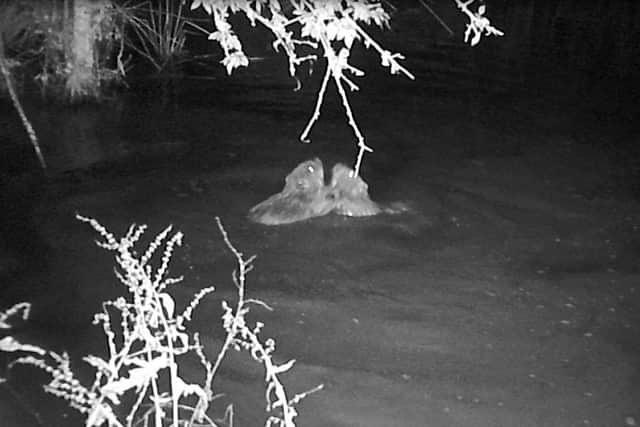Baby beavers born in Sussex for first time in 500 years
and live on Freeview channel 276
The kits were born at the world-renowned rewilding project on the Knepp Estate at West Grinstead, near Horsham.
Knepp ecologist Penny Green said: “We’re just absolutely thrilled.”
Advertisement
Hide AdAdvertisement
Hide AdThe babies’ parents – Brooke and Banksy – were relocated to Knepp from Scotland last year and Penny said that the Knepp team hoped they had bred when they were spotted taking leaves back to their lodge – a sign they were feeding their young.


Now the youngsters themselves have been seen swimming and playfighting near their lodge home.
Penny said that Brooke and Banksy had been busy “gnawing away and building new dams” and described them as ‘eco system engineers’ whose dam-building at Knepp has created little ponds and wetland habitats for other species “such as frogs, bats, birds and all sorts of wonderful wildlife.”
Beavers were once common in Britain but were hunted to the verge of extinction during the reign of King Henry VIII when they were prized for their fur and a secretion from their scent sacs which was used for making perfume and medicines. The last known British beaver was killed in 1789 in Yorkshire.
Advertisement
Hide AdAdvertisement
Hide AdAnother pair of beavers were introduced at Knepp in 2020 under licence for a ‘semi-enclosure.’ Knepp experts had hoped that the pair would settle into the rewilding project and stay on site there for many years. But both escaped within weeks.
The male – named Bramber – crossed 20 weirs heading down the River Adur towards Shoreham before eventually being captured on an organic farm. The female, Billie, escaped to an angling pond a mile away where she, too, was caught up.
Sadly, Bramber died on the night of his capture and tests later revealed he had succumbed to a virus. Billie is now with a mate in an enclosure on National Trust land.
Experts at Knepp say that research has identified beavers as a ‘keystone species’ whose activities result in an exponential rise in biodiversity. Their coppicing of trees along riverbanks – for food and to build dams and lodges – lets in sunlight which encourages green oxygen-producing aquatic plants.
Advertisement
Hide AdAdvertisement
Hide AdWoody debris dragged into the water by beavers allows micro-organisms to grow, providing fuel for populations of invertebrates which, in turn, provide food for fish and aquatic birds.
A spokesperson said: “As hydrological engineers, beavers are also hugely effective at creating water-systems that purify water, store it, and protect against devastating floods.
“Much of the work we’ve done at Knepp to restore watercourses, including returning our stretch of the River Adur to its floodplain, could have been done more efficiently and at no expense, by a family of beavers.
“We’ve been campaigning for greater appreciation of this keystone species for many years and hope it won’t be long before we see free-living beavers throughout the UK, with a reliable management plan to support their return and to swiftly address any problems they may cause farmers and land managers.”
